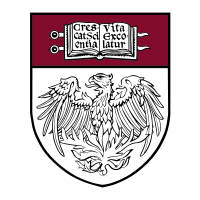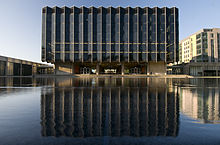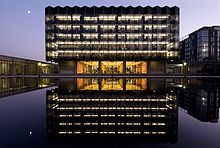- University of Chicago Law School
-
The University of Chicago Law School 
Established 1902 School type Private Dean Michael H. Schill Location Chicago, Illinois, USA Enrollment 589 [1] Faculty 140[1] USNWR ranking 5[1] Bar pass rate 95.15%[1] Annual tuition $44,757[1] Website http://www.law.uchicago.edu/ ABA profile The University of Chicago Law School The University of Chicago Law School was founded in 1902 as the graduate school of law at the University of Chicago and is among the most prestigious and selective law schools in the world. The U.S. News & World Report currently ranks it fifth among U.S. law schools, and it is noted particularly for its influence on the economic analysis of law.[2]
Contents
History
University president William Rainey Harper requested assistance from the faculty of Harvard Law School in establishing a law school at Chicago, and Joseph Henry Beale, then a professor at Harvard, was given a two-year leave of absence to serve as the first Dean of the law school. During that time Beale hired many of the first members of the law school faculty and left the fledgling school "one of the best in the country."[3]
The Law School experienced a period of profound growth and expansion under the leadership of Dean Edward Hirsch Levi, AB 1932, (1945–1962). Levi later served as university Provost (1962–1968) and President (1968–1975), and then as United States Attorney General under Gerald Ford. During his time at the Law School, Levi brought world-renowned scholars to the faculty and supported the Committee on Social Thought graduate program.[4]
The Law School is well known for its advancement of the application of social science to the law. A significant movement in jurisprudence began at the law school when Aaron Director initiated the first modern systemic investigation between the intersection of law and economics, an area in which the law school's faculty figure prominently.
Academics
- Legal History Program
- The John M. Olin Program in Law and Economics
- International and Comparative Law
- Law & Philosophy
Policy Initiatives
- Animal Law Policy Initiative
- Climate Change Online
- Foster Care to Adulthood
Research Centers
- Center for Comparative Constitutionalism
- Center for Law, Philosophy, and Human Values
- Center for Studies in Criminal Justice
- Milton Friedman Institute for Research in Economics
D'Angelo Law Library
The D'Angelo Law Library is part of the greater University of Chicago library system. Renovated in 2006, it features a spacious second-story reading room accessible by staircase made of steel, glass, and mahogany. Its upper floors are furnished with Modernist architect Eero Saarinen's Tulip and Womb chairs and Pedestal tables.
The Law Library is open 90 hours per week and employs the equivalent of 10 full-time librarians. It has study space for 483, a wireless network, and 26 networked computers available to students.
Admissions
Admission to The University of Chicago Law School is highly selective and enrolls approximately 185 new students each fall. According to its most recent ABA profile, Chicago received 5,579 applications and sent 849 offers. The Fall 2011 entering class has a median GPA of 3.87 and a median LSAT of 171.[5]
Grading
The University of Chicago Law School employs an exclusive grading system that places students on a scale of 155-186. The scale was 55-86 prior to 2003, but since then the school has utilized a prefix of "1" to eliminate confusion with the traditional 100 point grading scale. These numerical grades convert to the more familiar alphabetical scale roughly as follows: 155-159 = F, 160-167 = D, 168-173 = C, 174-179 = B, 180-186 = A. For classes of more than 50 students, professors are encouraged to set the median grade at 177, with the number of grades above a 180 approximately equaling the number of grades below a 173. Professors, however, are entitled to set a lower median at their discretion.
In a 21 June 2010 article in The New York Times, business writer Catherine Rampell criticized other schools' problems with grade inflation, but commended Chicago's system, saying "[Chicago] has managed to maintain the integrity of its grades."[6]
A student graduates "with honors" if a final average of 179 is attained, "with high honors" if a final average of 180.5 is attained, and "with highest honors" if a final average of 182 is attained. The last of these achievements is rare; typically only one student every few years will attain the requisite 182 average. Additionally, the Law School awards two honors at graduation that are based on class rank. The top 10% are honored as "Order of the Coif" members, and the top 5% are honored as "Kirkland Scholars" (a designation created in 2006 by a $7 million donation from the law firm of Kirkland & Ellis).[7]
Placement
Chicago ranks second on the "Top 15 Schools From Which the Most 'Prestigious' Law Firms Hire New Lawyers"; second for "Faculty quality based on American Academy of Arts and Sciences Membership"; third for "Supreme Court Clerkship Placement"; and fifth for "Student Quality".[8] The Law School is also notable for having the third highest gross and third highest per capita placement of alumni as U.S. Supreme Court clerkships (16% for the years 2000-2008),[9] with approximately 15-25% of each graduating class going on to a state or federal clerkship. Private career prospects are equally bright for graduates as they routinely place into elite firms.[10]
Publications and Organizations
Journals
The Law School produces six professional journals, and three are student-run: The University of Chicago Law Review, The Chicago Journal of International Law, and The University of Chicago Legal Forum. Students interested in membership on any of these journals participate in a writing competition at the end of first year. The Law Review selects 19 students for membership based on first year GPA ("grade on"), and 10 students for the quality of their writing competition submission ("write on"). The other two journals select members on the basis of writing competition submissions alone (without regard to GPA). All three student-run journals allow second and third year students to "write on" by submitting a piece of legal scholarship worthy of publication.
The Supreme Court Review, published by the law school and overseen by faculty since the 1960s, remains the most cited legal journal internationally with respect to commentary on the nation's highest court. The faculty also oversees publication of the Journal of Law and Economics and the Journal of Legal Studies.
Academic Paper Series
The Law School produces several series of academic papers, including the Public Law and Legal Theory Working Papers, the John M. Olin Program in Law & Economics Working Papers, and the Maurice and Muriel Fulton Lectures. It also produces a series of occasional papers.
Blogs
The Law School publishes several blogs, including the Law School Faculty Blog (the only institution-run blog named to the ABA Journal's Blawg 100), the well-known Becker-Posner Blog, Accolades and Achievements, the D'Angelo Law Library Blog, and the Electronic Projects Blog.
Organizations
There are approximately 60 student-run organizations at the Law School which fall under the umbrella of the Law Students Association. It is home to one of the three founding chapters of the Federalist Society. As a professor, Supreme Court justice Antonin Scalia helped organize the Chicago chapter of the society.[11] Chicago is also home to a large chapter of the progressive American Constitution Society for Law and Policy.
Student Awards
Leadership awards: The Ann Watson Barber Award and the LL.M. Award for Integration and Inclusion. Awards for academic performance: The Joseph Henry Beale Prize (for first year students); The John M. Olin Prize; The Francis Bustin Prize and The Casper Platt Award. Moot Court Competition awards: The Thomas R. Mulroy Prize, The Karl N. Llewellyn Cup, and The Edward W. Hinton Cup.
Architecture
The law school was originally housed in Stuart Hall, a Gothic-style limestone building on the campus's main quadrangles. Needing more library and student space, the law school moved across the Midway Plaisance to its current, Eero Saarinen-designed building (next to what was then the headquarters of the American Bar Association) in October 1959. The building contains classrooms, the D'Angelo Law Library, faculty offices, and an auditorium and courtroom, arranged in a quadrangle around a fountain (mimicking the college Gothic architecture of the campus's main quadrangles). The year saw a number of celebrations of the law school's new home, including a filming of the Today Show (then hosted by Barbara Walters) and appearances by Chief Justice Earl Warren, Governor (and later Vice President) Nelson Rockefeller and Secretary-General of the United Nations Dag Hammarskjöld.[12]
In 1987, and over the objections of the Saarinen family, the building was expanded to add office and library space (and the library renamed in honor of alumnus Dino D'Angelo). In 1998, a dedicated space for the law school's clinics, the Arthur Kane Center for Clinical Legal Education, as well as numerous additional classrooms, were constructed.[12] The library, classrooms, offices, and fountain received an acclaimed and award-winning renovation, completed in 2008, notable for the preservation of most of Saarinen's structure at a time when many modernist buildings face demolition.[13][14][15]
Faculty
The Law School faculty has consistently been an accomplished group of scholars and educators. Currently, there are four federal judges on the faculty. Historically, Law School professors have been tapped for high positions in both liberal and conservative administrations and have served officially and unofficially as advisers to presidents past and present.
Current
- Daniel Abebe
- Douglas Baird
- Omri Ben-Shahar
- Lisa Bernstein
- Anu Bradford
- Emily Buss
- Mary Anne Case
- Adam Cox
- Ronald Coase
- Kenneth W. Dam
- Rosalind Dixon
- Judge Frank H. Easterbrook (alumnus)
- Richard A. Epstein
- Lee Fennell
- Daniel Fischel
- Jacob Gersen
- Tom Ginsburg
- Grant Gilmore (deceased)
- Judge Douglas Ginsburg (alumnus)
- Thomas Hale
- Bernard Harcourt
- Richard H. Helmholz
- M. Todd Henderson
- Aziz Huq
- Dennis J. Hutchinson
- Joseph Isenbergh
- Alison LaCroix
- William Landes
- Brian Leiter
- Saul Levmore
- Anup Malani
- Richard H. McAdams
- Thomas J. Miles
- Martha Nussbaum
- Randal C. Picker
- Ariel Porat
- Eric Posner
- Judge Richard A. Posner
- Andrew M. Rosenfield
- Gerald N. Rosenberg
- Adam Samaha
- Michael H. Schill
- Geoffrey R. Stone (alumnus)
- Lior Strahilevitz
- David Strauss
- Cass Sunstein (Currently Harry Kalven Visiting Professor)
- David A. Weisbach
- Judge Diane P. Wood
- David Zarfes
Former
- Brainerd Currie
- David P. Currie (deceased)
- Supreme Court Justice Elena Kagan
- Harry Kalven (deceased)
- Lawrence Lessig
- Catharine MacKinnon
- Judge Michael W. McConnell (alumnus)
- Bernard D. Meltzer
- Judge Abner Mikva
- Dallin H. Oaks (alumnus)
- President of the United States Barack Obama (1992 to 2004)
- Supreme Court Justice Antonin Scalia
- Supreme Court Justice John Paul Stevens
Alumni
- Shimon Agranat: President of the Israeli Supreme Court 1965-1976
- John Ashcroft: Former U.S. Senator, Governor of Missouri, and Attorney General of the United States
- Alfred C. Aman, Jr.: Dean of Suffolk University Law School and Indiana University School of Law[disambiguation needed
 ]
] - Russell Baker: founder of the international firm Baker & McKenzie
- Laird Bell
- Danny Julian Boggs: Judge on the United States Court of Appeals for the Sixth Circuit.
- Robert Bork: Former Solicitor General of the United States, acting Attorney General of the United States, and Judge on the United States Circuit Court of Appeals for the D.C. Circuit; unsuccessfully nominated to the Supreme Court
- Carol Moseley Braun: U.S. Senator from Illinois; first (and only) African-American female U.S. Senator; sought 2004 Democratic Party presidential nomination
- Sophonisba Breckinridge: first woman to graduate from the Law School in its first class
- Elizabeth Cheney: head of the Iran Syria Policy and Operations Group (ISOG) and daughter of former U.S. Vice President Richard Cheney
- Marvin Chirelstein: Professor at Columbia Law School
- Norton Clapp: Former president and chairman of Weyerhaeuser, former president of Boy Scouts of America
- Ramsey Clark: Former Attorney General of the United States
- James Comey: Former Acting Attorney General of the United States, former Deputy Attorney General of the United States, and former United States Attorney (for the Southern District of New York)
- James I. Dolliver: Former U.S. Representative
- Frank Hoover Easterbrook: Chief Judge of the United States Court of Appeals for the Seventh Circuit.
- Jerome Frank: Former Chairman of the Securities and Exchange Commission
- E. Harold Hallows, Chief Justice of the Wisconsin Supreme Court
- James C. Ho: Former Solicitor General of Texas
- James Hormel: First openly gay United States Ambassador (to Luxembourg)
- Harold L. Ickes
- Douglas H. Ginsburg: Chief Judge of the United States Court of Appeals for the D.C. Circuit; unsuccessfully nominated to the Supreme Court
- Mary Ann Glendon: Learned Hand Professor of Law at Harvard University; US Ambassador to the Holy See
- Jan Crawford Greenburg: ABC News legal correspondent (well known for Supreme Court coverage)
- Phillip E. Johnson: Founder of the Intelligent Design movement
- David Aaron Kessler: Former FDA Commissioner, former Dean of the Yale School of Medicine, and current Dean of the University of California, San Francisco Medical School
- Amy Klobuchar: U.S. Senator from Minnesota
- Alexander Krasnoshchyokov, the Head of the Far Eastern Republic (1920 to 1921)
- Rex E. Lee: Former Solicitor General of the United States and President of Brigham Young University
- Edward H. Levi: Former Attorney General of the United States
- Harvey Levin: Popular purveyor of celebrity gossip and legal commentary
- Michael W. McConnell: Judge on the United States Circuit Court of Appeals for the Tenth Circuit
- David M. McIntosh: Former U.S. Congressman from Indiana (1994–2001)and Co-Founder of the Federalist Society. Indiana Republican gubernatorial nominee in 2000
- Patsy Mink: Former U.S. Representative
- Abner J. Mikva: Former U.S. Congressman from Illinois and Chief Judge of the United States Court of Appeals for the D.C. Circuit
- Jonathan Mitchell: Solicitor General of Texas and Professor at George Mason Law School
- Sir Geoffrey Palmer: 33rd Prime Minister of New Zealand
- Nicholas J. Pritzker: Chairman of the Board and CEO of the Hyatt Development Corporation
- Thomas Pritzker: Chairman and CEO of Global Hyatt Corporation
- Abraham Ribicoff: U.S. Senator from Connecticut
- Lee H. Rosenthal: Judge on the United States District Court for the Southern District of Texas
- David M. Rubenstein, Founder, The Carlyle Group
- Kyle Sampson, former Chief of Staff and Counselor of United States Attorney General Alberto Gonzales
- Mary M. Schroeder: judge on the United States Court of Appeals for the Ninth Circuit.
- Adam Silver: NBA Deputy Commissioner and Chief Operating Officer
- Milan Dale Smith, Jr.: judge on the United States Court of Appeals for the Ninth Circuit,
- Barbara Snyder: President of Case Western Reserve University
- Jim Talent: Former U.S. Congressman and U.S. Senator from Missouri
- David S. Tatel: Judge of the United States Court of Appeals for the District of Columbia Circuit
- Studs Terkel Notable Chicago Radio Personality, Journalist and Author
- Julian Seesal Waterman: Founder and first Dean of University of Arkansas Law School
References
- ^ a b c d e [1]
- ^ U.S. News and World Report Law School Rankings
- ^ Williston, Samuel, "Ben Dover: A Biographical Sketch",56 Harvard Law Review No. 5, p. 687-8
- ^ http://www-news.uchicago.edu/releases/00/000307.levi.shtml
- ^ [2]
- ^ http://www.nytimes.com/2010/06/22/business/22law.html?pagewanted=1&sq=law%20school&st=cse&scp=1
- ^ [3]
- ^ [4]
- ^ [5]
- ^ [6]
- ^ http://www.law.uchicago.edu/studentorgs/federalist
- ^ a b http://www.law.uchicago.edu/alumni/magazine/fall09/building
- ^ http://online.wsj.com/article/SB122341764591312909.html
- ^ http://featuresblogs.chicagotribune.com/theskyline/2008/07/polishing-a-saa.html
- ^ http://www.il-asla.org/awards_2009_president_3.html
External links
- The University of Chicago Law School
- The University of Chicago
- The University of Chicago Law Review
- The University of Chicago Faculty Blog
- M.P.P./J.D. - Joint Degree with the Law School
Categories:- Law schools in Illinois
- University of Chicago
- University of Chicago Law School
- Eero Saarinen structures
- Educational institutions established in 1902
Wikimedia Foundation. 2010.


